
Keeping track of passwords can be a nightmare. With every website, app, and subscription demanding a unique, complex password, it’s no wonder users are overwhelmed.
A recent Verizon 2025 Data Breach Investigations Report reveals that 60% of data breaches involve human error, with weak or reused passwords being the most common. There’s even a study that shows over half of all Gen Z users recycle passwords. This is risky, as hackers can access several accounts at a time and wreak havoc.
That’s where password managers come in. These tools generate, store, and autofill strong passwords, which makes your digital life safer and easier.
We dive deep into the 8 top password managers—Proton Pass, Bitwarden, 1Password, Apple
Passwords, Keeper, Dashlane, NordPass, and LastPass. This is to help you understand what makes each one tick.
Why Bother with a Password Manager?
Picture this: you’ve 100+ accounts for everything from Netflix to your bank. Writing these passwords down or reusing “Fluffy123” is likely to land you in trouble. Password managers come to the rescue by:
- Creating bulletproof passwords: They whip up random, hack-resistant passwords tailored to each site’s rules.
- Locking them up tight: Your passwords live in an encrypted vault, accessible only with a master password or your fingerprint.
- Making logins a breeze: Autofill handles the heavy lifting, so you don’t have to remember or type anything when logging in.
- Syncing everywhere: Access your passwords on your phone, laptop, or tablet, no matter the brand.
- Extra goodies: Many throw in two-factor authentication (2FA), breach alerts, or even passkey support for passwordless logins.
How We Judged Them
We found many password managers out there. To figure out which password manager deserves your trust, we looked at the following:
- Security: How strong is the encryption? Is it zero-knowledge? Is there any sketchy breach history? Is the software audited?
- Features: Beyond passwords, what else do you get—passkeys, sharing, or cool extras like VPNs?
- Ease of Use: Is it simple enough for your tech-averse grandma to handle?
- Compatibility: Does it work on Windows, Mac, Linux, iOS, Android, and your favorite browser?
- Price: Is it worth your cash, and does it have a solid free option?
- Support: Can you get help when you’re stuck via chat, email, or phone?
Top Password Managers you need to consider
Below are eight of the best password managers available. Each has unique features that appeal to specific users.
1. Proton Pass
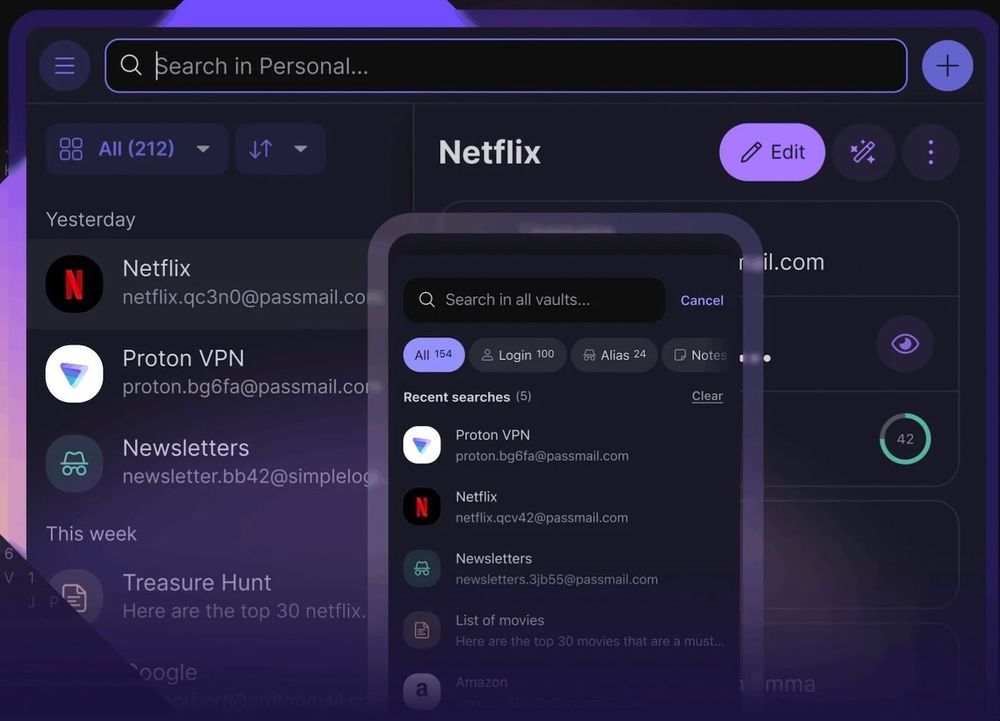
What’s the Deal?
Proton Pass is a Swiss company that is also behind ProtonMail. Launched in 2023, this password manager is already making waves with its open-source approach and a free tier that’s hard to beat. This means anyone can enjoy awesome basic features for free forever. The company doesn't have a history of breaches so far.
Security
Proton Pass locks your data with AES-256 encryption and Argon2 key derivation, which makes it hard for anyone to crack the master password. It’s also zero-knowledge, meaning even Proton itself can’t peek at your vault.
You can add 2FA with apps like Authy or your phone’s biometrics. Since the software is open-source, security nerds can check the code, and third-party audits keep everything safe. Proton Pass also uses Secure Remote Password (SRP) protocol, which means that passwords are not sent via the network. Your login details stay safe even if someone is sniffing your Wi-Fi.
Features
- Password Powerhouse: Generates random passwords and autofills them on websites and apps so that you don’t have to remember them.
- Passkey Ready: Stores passkeys for sites that support passwordless logins.
- Secure Sharing: Send passwords to friends or coworkers with encryption and access controls.
- Hide-My-Email: Its email masking feature creates disposable email aliases to keep your real email off spammy lists.
- Proton Sentinel: Watches for sketchy login attempts and blocks hackers before they get far.
- Organized Vaults: Sort your logins into personal, work, or family categories so that it’s easy to find them.
- The free tier offers unlimited passwords and syncing across devices, no strings attached.
If you are already using ProtonMail or ProtonVPN, Proton Pass fits right into their privacy-first ecosystem.
Ease of Use
Proton Pass keeps things simple with a clean interface. Setup is also easy. You just sign up, pick a master password, and grab the browser extension (Chrome, Firefox, Edge, Brave) or mobile app (iOS, Android). The free tier is great for beginners, but you will need a paid plan for features like email masking. Autofill works well, though some users gripe about occasional hiccups on older phones. The desktop app (Windows, macOS, Linux) syncs smoothly. A handy import tool for switching from other managers is also available.
Compatibility
Works on Windows, macOS, Linux, iOS, Android, and major browsers. You can sync your passwords across different operating systems and browsers without a problem. It offers your passwords at your fingertips wherever you are.
Pricing
- Free tier: Offers unlimited passwords, passkeys, and syncing.
- Proton Pass Plus: for $1.99/month for business and $2.99/month for individuals (yearly pricing), it adds email masking and better sharing.
- Proton Unlimited: $9.99/month bundles Pass with ProtonMail, ProtonVPN, and 500GB of Proton Drive storage. An all-inclusive package for businesses comes at $12.99 /month with yearly pricing.
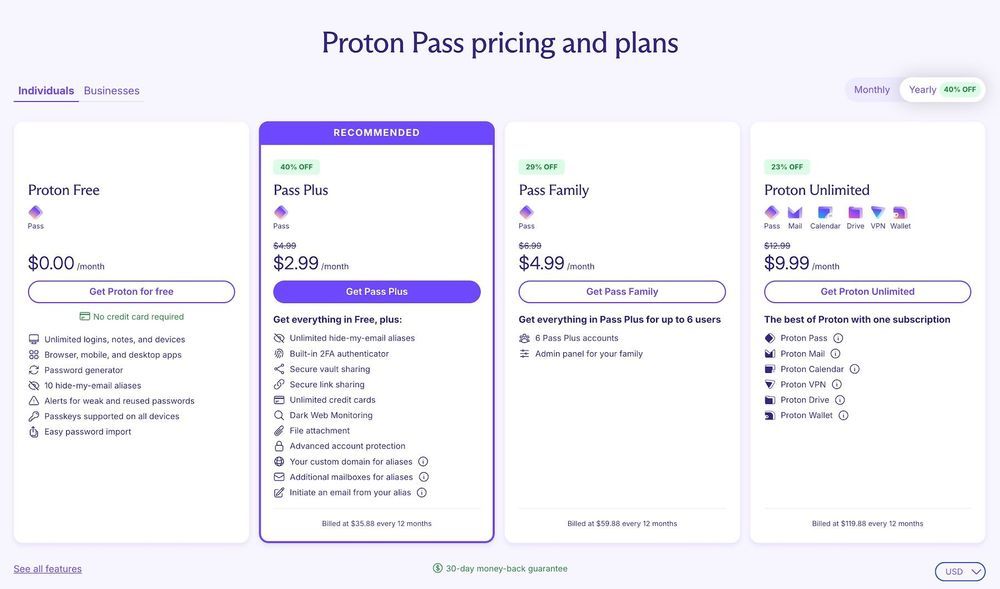
Support
Email support is available for everyone. However, it has faster replies for paid users. But there’s no live chat or phone, which can be annoying if you’re stuck. Fortunately, the knowledge base is solid, and users often share tips in community threads.
Pros
- Offers top-notch encryption and Swiss privacy.
- It has an awesome free tier with no limits.
- Email masking keeps your inbox safe.
- Clean record with no breaches.
Cons
- The interface isn’t super polished.
- Limited support options for users.
- Still a newer player, so features are growing.
Who Is It For?
Perfect for privacy enthusiasts, small teams, or anyone seeking a free, secure option with email protection. If you’re already in Proton’s ecosystem, it is a great addition to secure different aspects of your digital footprint.
2. Bitwarden
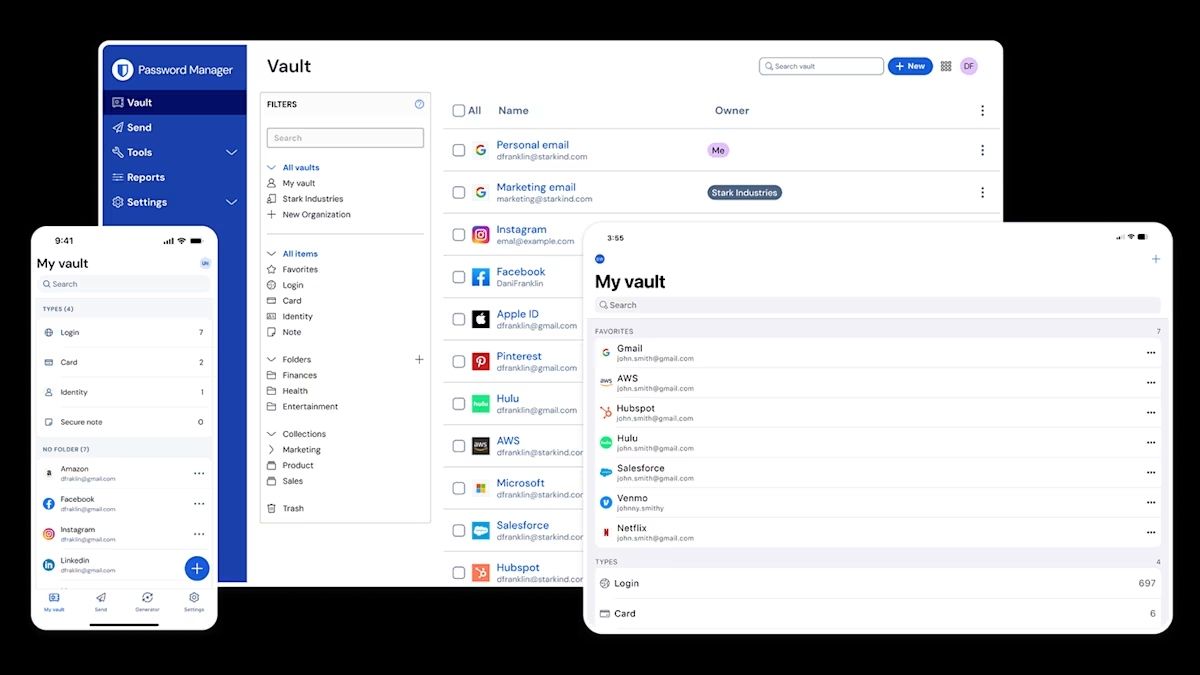
What’s the Deal?
Bitwarden is the go-to for anyone who loves free stuff that actually works. It is open-source, meaning anyone can poke around its code. The service has a free tier that puts most paid managers to shame. A good number of tech websites call it the best free option. It is a favorite for tech geeks building custom workflows, thanks to the CLI and API.
Security
Bitwarden uses AES-256 encryption and PBKDF2 SHA-256, two technologies that make it hard to crack passwords. It is also zero-knowledge, so Bitwarden’s team can’t snoop at your vault. You can add 2FA with apps, SMS, biometrics, or hardware keys like YubiKey to further strengthen the security.
There are no records of a breach. Besides, regular audits by firms like Cure53 keep it trustworthy by checking for any loopholes. The best deal is that you can self-host Bitwarden on your server. This means that your data never touches the cloud, making it ideal for paranoid users or businesses.
Features
- Password Pro: Unlimited storage, generation, and autofill, even for free users.
- Passkey Support: Handles passwordless logins like a champ.
- Sharing Made Easy: Free users can share with one other person. Paid plans open it up to families or teams.
- Password Checkup: It flags weak, reused, or hacked passwords to enhance your security.
- Self-Hosting: Run your own Bitwarden server for total control.
- File Storage: Premium users get 1GB of encrypted storage, enough for thousands of passwords.
- Developer Tools: It has a command-line interface (CLI) and API for custom integrations into websites and networks.
- The open-source community keeps Bitwarden fresh with constant updates and new features.
Ease of Use
While Bitwarden’s interface gets the job done, it looks like it’s stuck in 2018. Its UI may need some polishing. However, the setup is simple. You just sign up, install the app or extension, and add your passwords. It has an “Organizations” system for sharing.
Unfortunately, it can feel like a puzzle for newbies, but once you get it, it’s powerful. Extensions (Chrome, Firefox, Edge, Safari, Brave, Opera) and mobile apps (iOS, Android) work well, and there’s tons of community help online.
Compatibility
Bitwarden’s a compatibility beast. It works with Windows, macOS, Linux, iOS, Android, and even obscure browsers like Vivaldi or Tor. The self-hosting feature makes it perfect for Linux nerds or businesses.
Pricing
- Free: Unlimited passwords, syncing, and two-person sharing.
- Premium: $10/year for 1GB storage and advanced 2FA.
- Families: $40/year for six users.
- Business: Starts at $4/user/month.
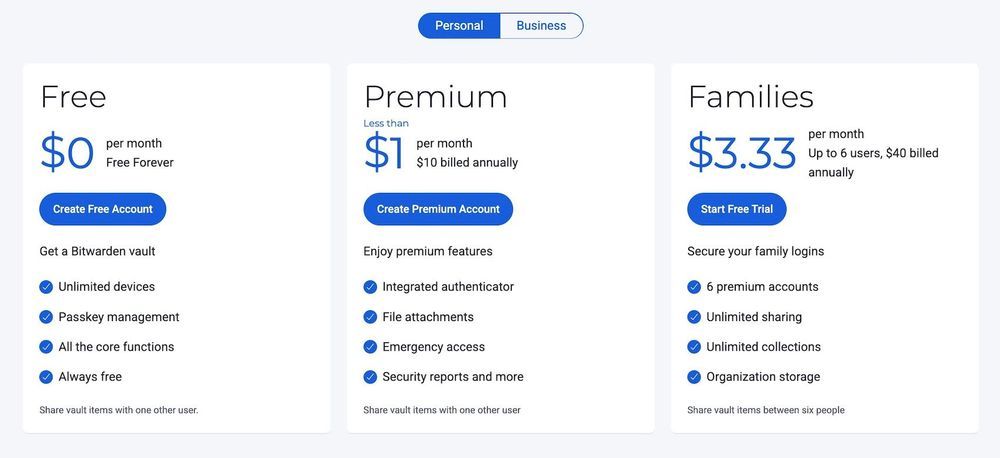
Support
Email support and a community forum are your main options. Paid users get faster replies. However, there is no live chat or phone support. You will also get an open-source crowd on GitHub and X, which is super helpful.
Pros
- Best free tier out there.
- Open-source and audited.
- Offers self-hosting for ultimate privacy.
- Cheap paid plans with specific benefits.
Cons
- Has a clunky interface.
- Sharing can be tricky to set up.
- No live support.
Who’s It For?
Bitwarden is ideal for tech-savvy users, budget-conscious users, or small businesses that want a free or cheap manager with robust security. Its self-hosting feature is a godsend for anyone who doesn’t trust cloud storage.
3. 1Password
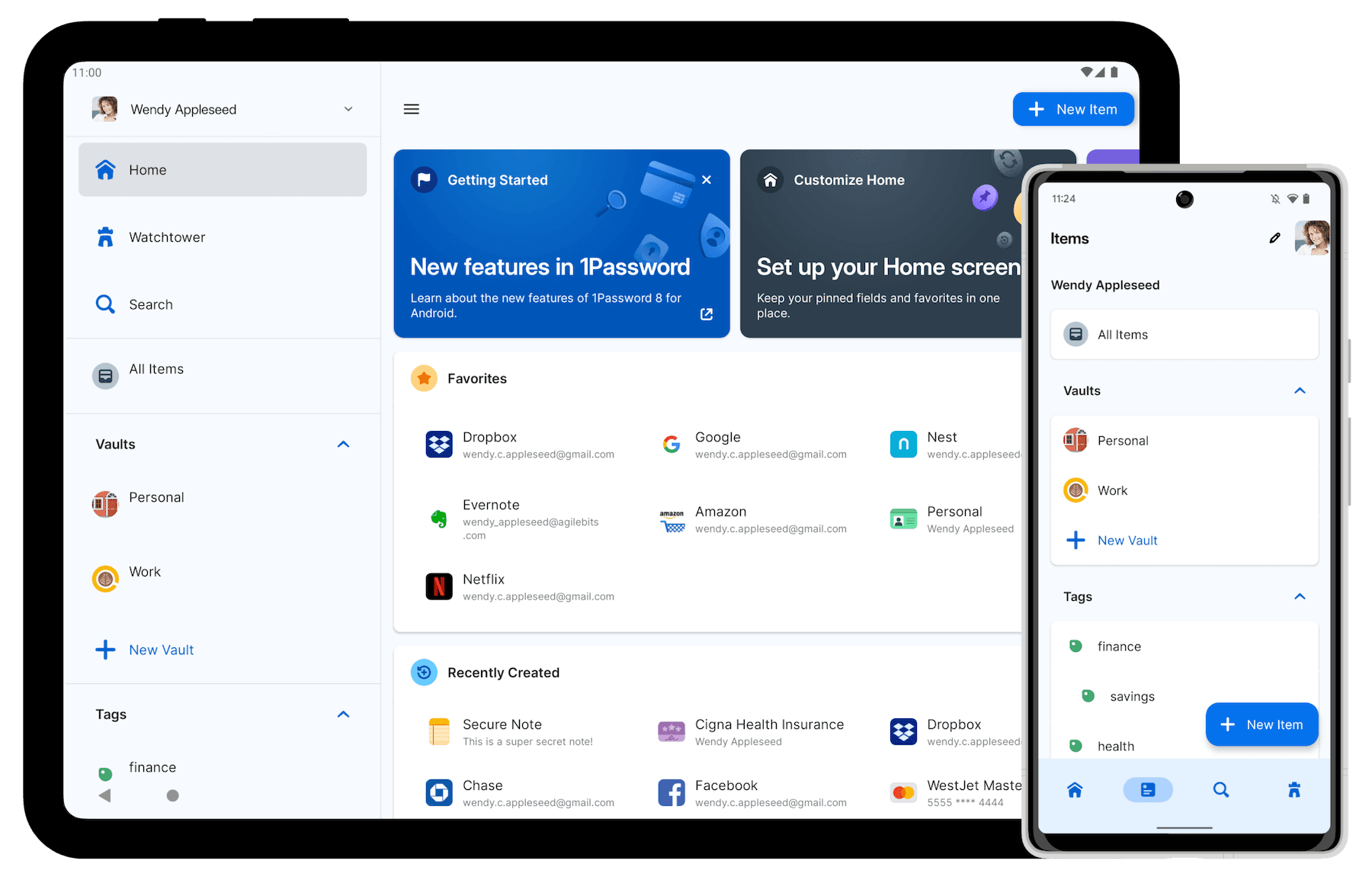
What’s the Deal?
1Password is the fancy sports car of password managers. It is sleek, powerful, and a bit pricey. Most users rave about its ease of use and killer features. This makes it a top pick for families and businesses that want a premium experience without the hassle.
Security
1Password uses AES-256 encryption and a zero-knowledge setup. You need both a master password and a 128-bit secret key to get in, which is like a double lock on your vault. It supports 2FA with apps, biometrics, or hardware keys.
This password has never had any breaches, and audits by NCC Group (a leading end-to-end cybersecurity firm) keep it transparent. The Secure Remote Password (SRP) protocol ensures your login stays safe, as your passwords are not sent over the network. So, you can log in even on sketchy networks.
Features
- Password Guru: Generates, stores, and autofills passwords, with custom fields for stuff like security questions.
- Passkey Beta: Stores passkeys, with full support coming soon.
- Vault Sharing: Create separate vaults for work, home, or travel, with easy sharing options.
- Travel Mode: Hides sensitive vaults when you’re crossing borders. It is perfect for globetrotters.
- Watchtower: Checks for weak, reused, or breached passwords using the ‘Have I Been Pwned’ breach notification service.
- Masked Emails: Works with Fastmail for disposable emails (This feature needs a separate subscription).
- Extra Storage: Save credit cards, IDs, or secure notes in its safe store.
- Business plans add single sign-on (SSO) and admin tools for teams.
Ease of Use
1Password’s interface is a joy—colorful, intuitive, and packed with helpful prompts. Setup is also a breeze: download the app, create an account, and save your secret key (don’t lose it!). Extensions (Chrome, Firefox, Edge, Safari, Brave) and mobile apps (iOS, Android) are buttery smooth, with autofill that just works. Most users can’t stop raving about the polish, though some grumble about no free tier.
Compatibility
1Password covers Windows, macOS, Linux, iOS, Android, and major browsers. Linux support is also solid. You can sync passwords among all these options.
Pricing
- Individual: $2.99/month with annual payment.
- Families: $4.99/month with an annual payment for five users.
- Business: starts at $7.99/user/month with SSO.
- 14-day trial, no free tier.
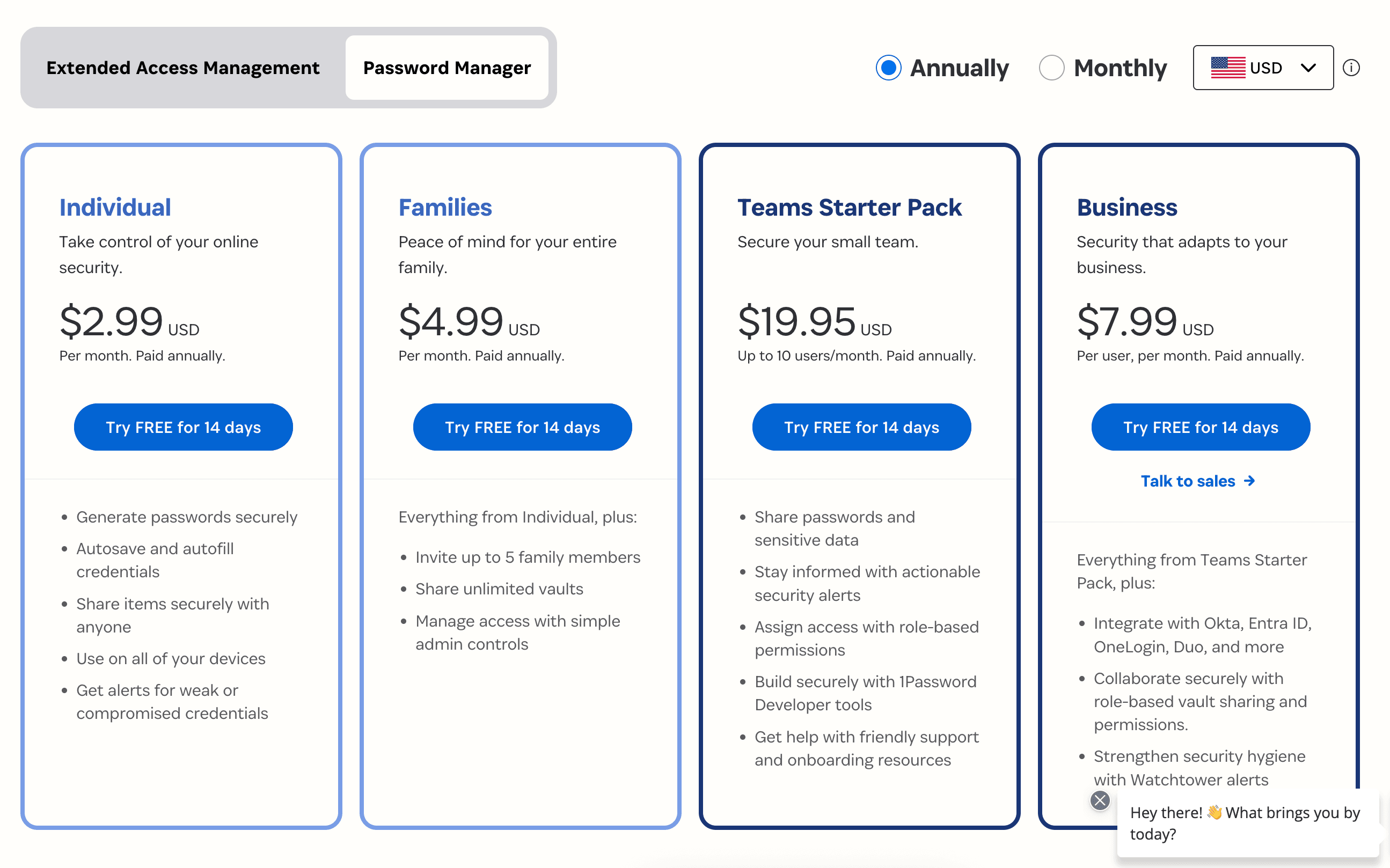
Support
1Password offers 24/7 email support and a detailed help center. Paid users get priority, but there is no live chat or phone. Most users say email responses are quick and helpful.
Pros
- Gorgeous, user-friendly design.
- Cool features like Travel Mode.
- Spotless security record.
- Great for families and teams.
Cons
- No free tier.
- Pricey compared to Bitwarden.
- A secret key can be a pain if lost.
Who’s It For?
Families, businesses, or anyone who wants a premium, hassle-free experience with top-tier security.
4. Apple Passwords
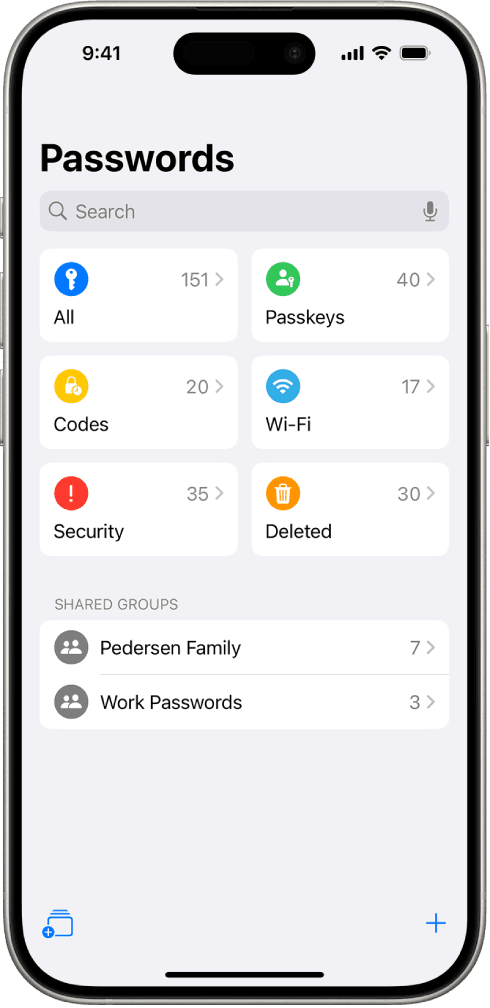
What’s the Deal?
Apple Passwords is the free, no-fuss password manager built into iCloud Keychain. If you’re all-in on Apple—iPhone, iPad, Mac—it’s a seamless way to manage passwords without downloading anything. But if you use Android or Windows, you have to look elsewhere.
Security
Apple uses AES-256 encryption and iCloud’s end-to-end encryption to keep your data safe. It supports Face ID, Touch ID, and passkeys, all stored in Apple’s Secure Enclave. There are no breaches ever, thanks to Apple’s locked-down ecosystem. The downside? 2FA is limited to Apple’s methods (SMS or device codes), which are not as flexible as others.
Features
- Password Basics: Stores passwords, credit cards, and Wi-Fi credentials, with autofill in Safari and Apple apps.
- Passkey Pro: Generates and stores passkeys for passwordless logins.
- Security Alerts: Warns about weak or hacked passwords in the vault.
- Easy Sharing: Share passwords via AirDrop or iMessage in a few clicks.
- Wi-Fi Trick: Share Wi-Fi access with nearby Apple users using the vault.
Ease of Use
Using this password manager is dead simple. Go to Settings on your iPhone or Mac, and it’s already there. Autofill works great in Safari, and passkeys are a breeze. However, the interface is barebones, and advanced users might miss extra features. Users love the simplicity but hate the lack of non-Apple support.
Compatibility
Only for Apple devices (iPhone, iPad, Mac, Vision Pro). You can access passwords on Windows or Android via iCloud in a browser, but it’s clunky and lacks autofill.
Pricing
- Free: Comes with your Apple device and iCloud.
Support
Apple’s standard support (online, phone, Genius Bar) applies, but there’s no dedicated help for passwords. You’re stuck with forums or Apple’s general resources.
Pros
- Free and built-in.
- Seamless with Apple devices.
- Passkey support is top-notch.
- No breaches.
- The Wi-Fi sharing option is great for teams in a zone.
Cons
- Barebones features.
- Useless outside Apple’s ecosystem.
- Limited 2FA options.
Who’s It For?
Apple diehards who want a free, no-hassle manager and don’t need cross-platform support.
5. Keeper
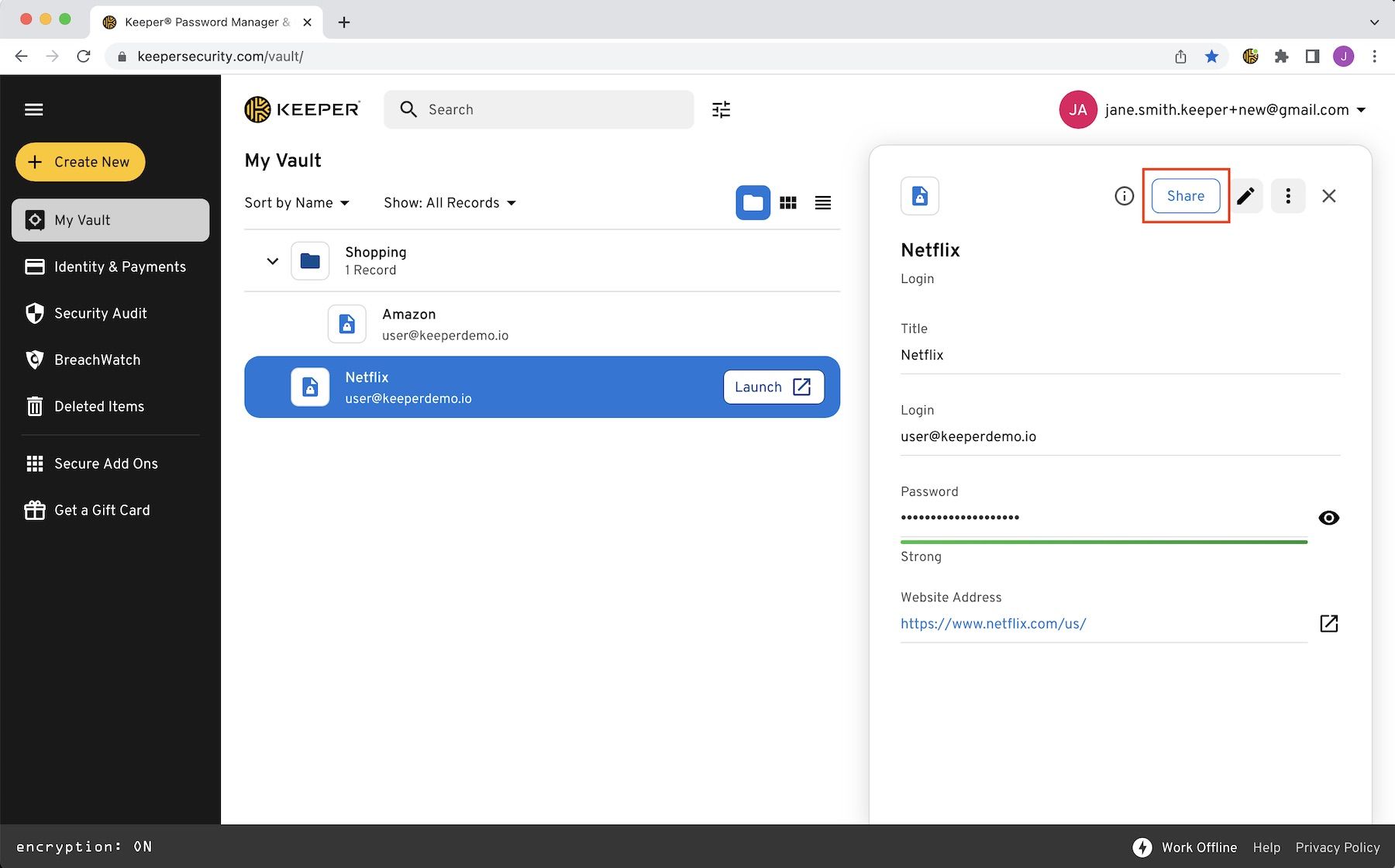
What’s the Deal?
Keeper is the tank of password managers. It is a tool built for security and loved by businesses. Its certifications and hardcore encryption make it a go-to for pros and commercial environments that need robust security. However, it is not the friendliest for casual users.
Security
Keeper uses AES-256 encryption, PBKDF2, and zero-knowledge design. Nobody, including employees of Keeper, can snoop at your vault. It also supports 2FA with apps, SMS, biometrics, or YubiKey. Interestingly, it has a self-destruct feature that wipes local data after five failed logins. This is perfect for avoiding hacking on stolen devices.
The password manager meets standards like FIPS 140-2 and SOC 2, with yearly audits. So, you are assured of ultimate security for your password at all times. Its compliance features make it a favorite for industries like healthcare or finance, where regulations like HIPAA apply.
Features
- Password Pro offers unlimited storage, generation, and autofill features.
- Passkey Support: Stores passkeys for passwordless logins.
- Secure Sharing: Time-limited shares can self-destruct for added security.
- BreachWatch: Scans the dark web for hacked credentials and alerts you to change them.
- File Storage: You get up to 10GB of encrypted storage for documents.
- Record Organizer: Sort passwords, notes, or files into folders for easier reach.
- Business Tools: Role-based access, SSO, and compliance reporting simplify business security.
Ease of Use
Keeper’s interface is solid but feels like it’s built for IT admins, not your average Joe. Setup is easy, but the dashboard can be overwhelming with all its options. Extensions (Chrome, Firefox, Edge, Safari) and apps (iOS, Android) work great and offer autofill support. Most users love the security but say the design could use some polishing.
Compatibility
The password manager works on Windows, macOS, Linux, iOS, Android, and major browsers. Linux support is strong, and syncing is smooth.
Pricing
- Personal: $39.99/year.
- Family: $84.99/year for five users.
- Business: $24/user/year. There is custom pricing for teams.
- Military and medical: 30% off from business pricing
- Students: 50% off personal pricing
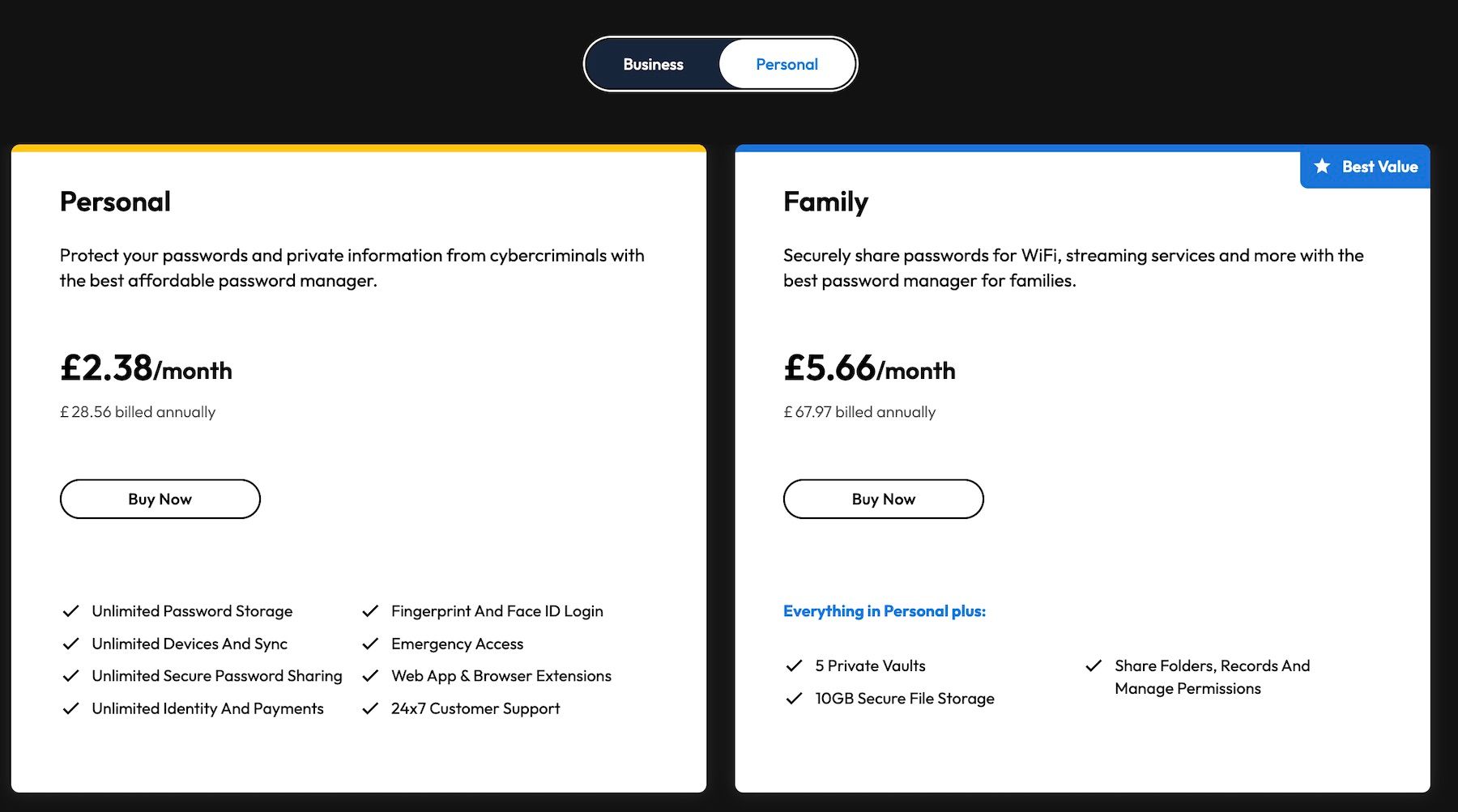
There is a 14-day trial, with no free tier.
Support
Keeper offers 24/7 email and live chat, with phone support for businesses. Most users say support is fast and helpful.
Pros
- Ironclad security with certifications.
- Self-destruct shares are unique.
- Great for businesses.
- No breaches so far
Cons
- No free tier, only a trial.
- The interface isn’t beginner-friendly.
- Pricey for families.
Who’s it for?
Businesses or security geeks who care more about protection than a pretty interface.
6. Dashlane
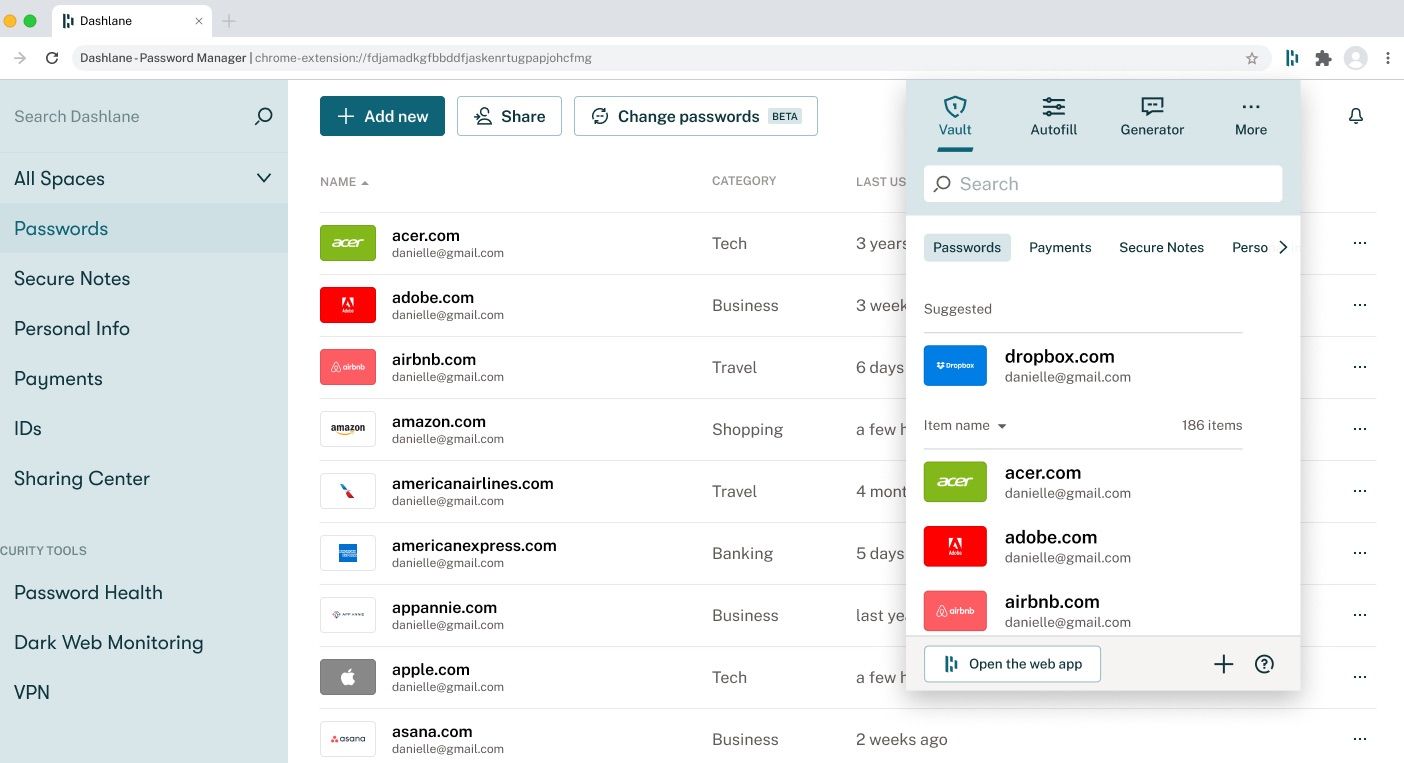
What’s the Deal?
Dashlane is the cool, approachable password manager that feels like it was designed by your tech-savvy friend. It’s got a slick interface, a VPN, and phishing protection, but it is pricey. Besides, a 2016 breach ( although no sensitive data was lost in the hacking) lingers in some users’ minds.
Security
Dashlane uses AES-256 encryption and zero-knowledge design. The strong security and non-snooping capability make for perfect password storage. It also supports 2FA with apps, biometrics, or hardware keys. The 2016 breach was minor, and Dashlane has beefed up security since, with regular audits. No new breaches have been announced.
Features
- Password Pro: Unlimited storage, generation, and autofill for all users.
- Passkey Support: Handles passwordless logins effectively
- Phishing Shield: Warns you about malicious websites in real time for action.
- VPN: Offers basic VPN via Hotspot Shield (it is not the fastest, but it comes in handy).
- Dark Web Monitoring: Alerts for hacked credentials for changes.
- Secure Notes stores credit cards or private notes.
- The Password Health feature checks for weak or reused passwords.
Ease of Use
Dashlane’s interface is clean, colorful, and packed with tutorials. You will have an easy time finding your way around. Setup is also quick. Just install the app, sign up, and add extensions (Chrome, Firefox, Edge, Safari). Mobile apps (iOS, Android) and the desktop app sync perfectly. Most users call it the easiest manager.
Compatibility
Works on Windows, macOS, iOS, Android, and major browsers. You can update your vault from one platform to another with ease.
Pricing
- Free: 25 passwords and works with one device.
- Premium: $4.99/month/billed annually with VPN and monitoring.
- Family: $7.49/month/billed annually for 10 users and all premium features.
- 30-day trial for the premium plan.
- Business pricing starts at $20/month/billed annually for 10 users.
- There is custom pricing for organizations of over 100 users.
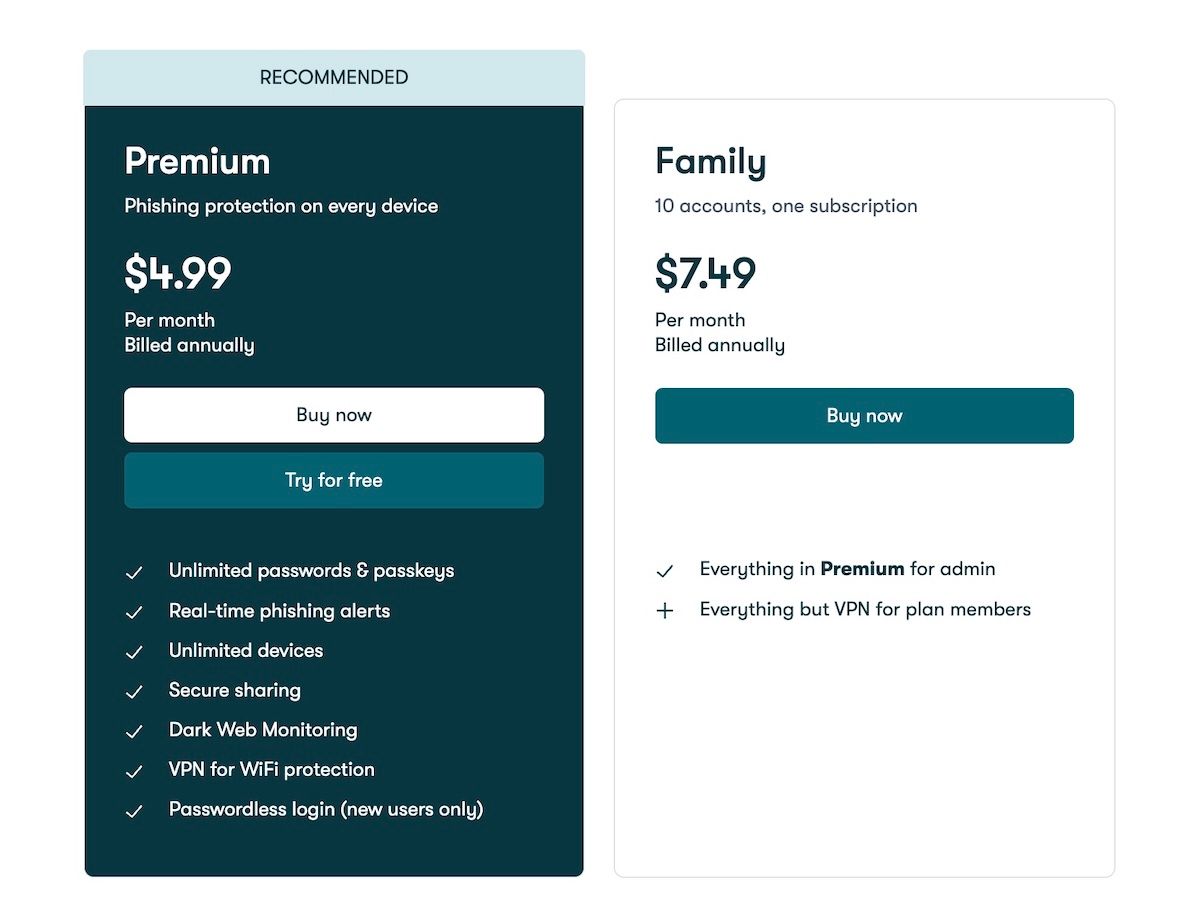
Support
There is email and live chat for paid users, with a great help center. Support is quick.
Pros
- Super easy to use.
- Offers VPN and phishing protection.
- Great for families and large groups.
- Dark web monitoring is great for keeping credentials safe.
Cons
- Pricey plans.
- The 2016 breach still spooks some.
- The free tier is greatly limited.
Who’s It For?
Beginners or families who want a friendly manager with extra perks. Great for small and medium businesses, too.
7. NordPass
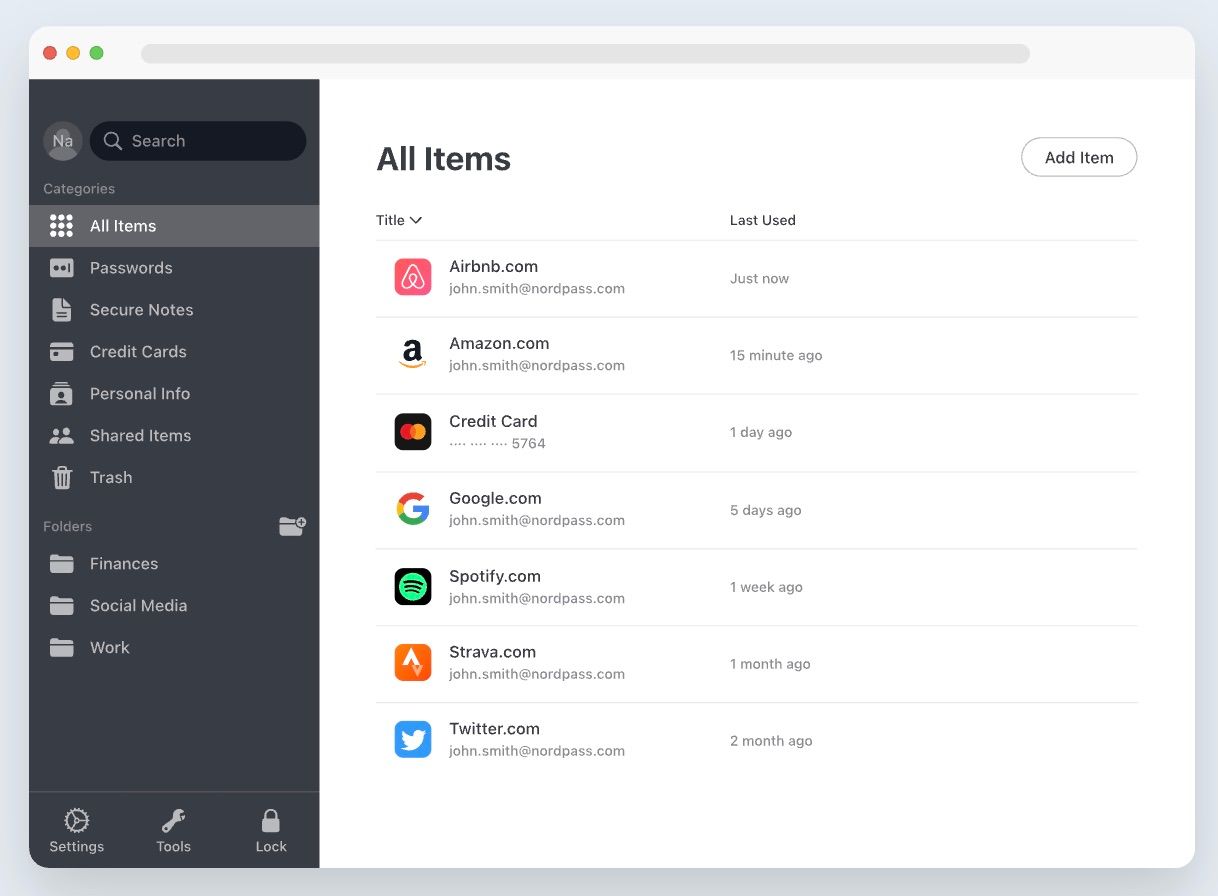
What’s the Deal?
NordPass is offered by the NordVPN crew, a popular VPN solution. It is a sleek, affordable option with modern encryption and cool features like email masking. NordPass is a great all-around choice for anyone who wants a polished manager without breaking the bank.
Security
NordPass uses XChaCha20 encryption, which is faster than AES-256 on phones but has similar robustness. Its zero-knowledge model prevents snooping on the servers or in the network. The password manager supports 2FA with apps, biometrics, or hardware keys. It has no breaches, and audits by Cure53 keep it legit. Their Authopia feature also lets businesses add passkey logins.
Features
- Password Pro: Unlimited storage, generation, and autofill.
- Passkey Support: Stores passkeys with Authopia for businesses.
- Breach Scanner: Checks the dark web for leaks.
- Secure Sharing: Encrypted shares with revocable access.
- Email Masking: Disposable email aliases for privacy.
- OCR Scanning: Imports logins from scanned documents (for premium users only).
Ease of Use
NordPass’s interface is as slick as 1Password’s. It has an easy setup and clear navigation. Extensions (Chrome, Firefox, Edge, Safari) and apps (iOS, Android) are also user-friendly. Users love the design but wish more features were free.
Compatibility
It works in Windows, macOS, Linux, iOS, Android, and major browsers. Linux support is great, and syncing among platforms is seamless.
Pricing
This provider has one-year and two-year plans with different pricing. There is also a five-person and 10-person bundle with different prices. Family pricing caters to six members.
- Free: Offers unlimited passwords and basic features.
- Premium: Pricing starts at $1.49/month, billed annually, with breach scanning and email masking.
- Business: Pricing starts at $1.99 for a 10-user package with an annual payment.
- 14-day money-back guarantee.
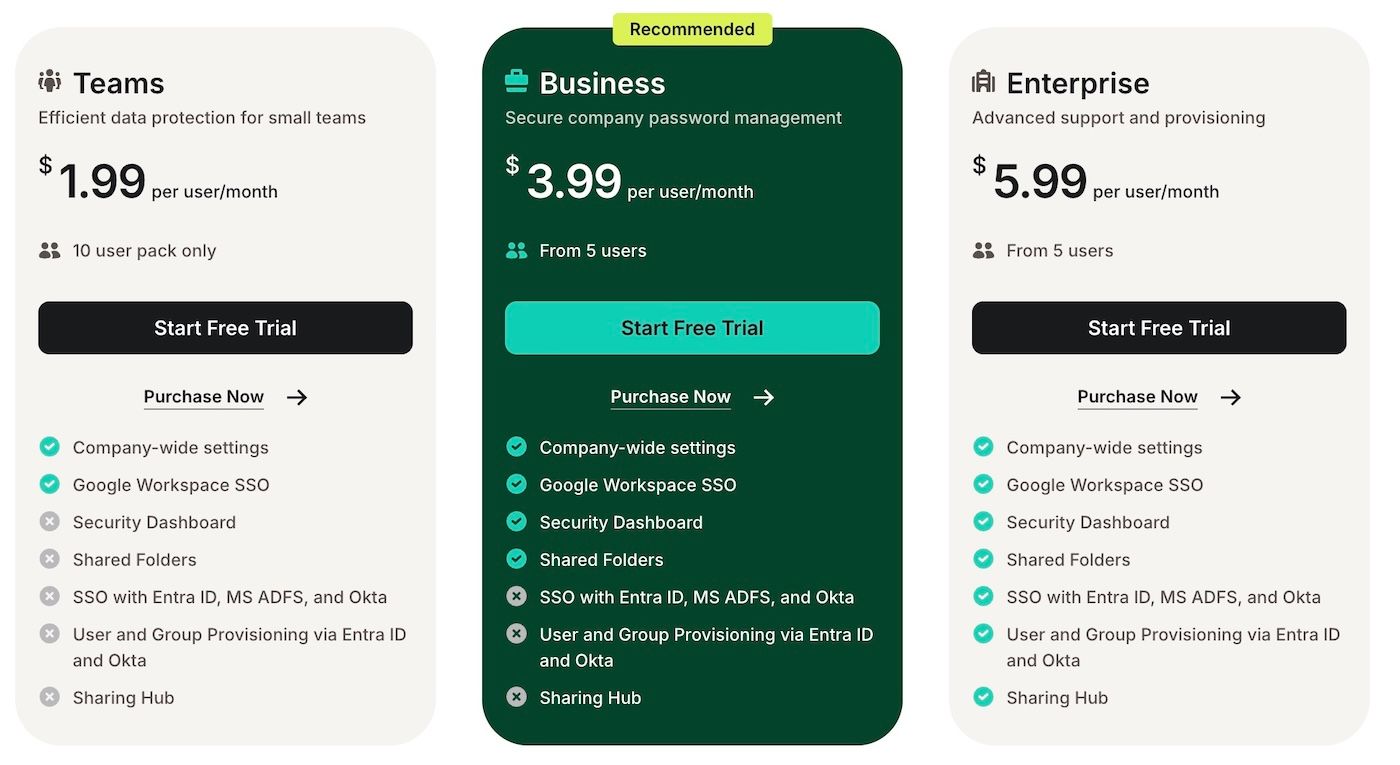
Support
You get 24/7 email and live chat support, with priority for premium users. Most users say support is fast and friendly.
Pros
- Modern encryption.
- Cheap and polished.
- Email masking and OCR scanning.
- No breaches.
- Bundling with NordVPN is a nice perk for privacy fans.
Cons
- Some features cost extra.
- Fewer browser extensions than Bitwarden.
Who’s It For?
Anyone who wants a modern, affordable manager with a clean design and optional VPN.
8. LastPass
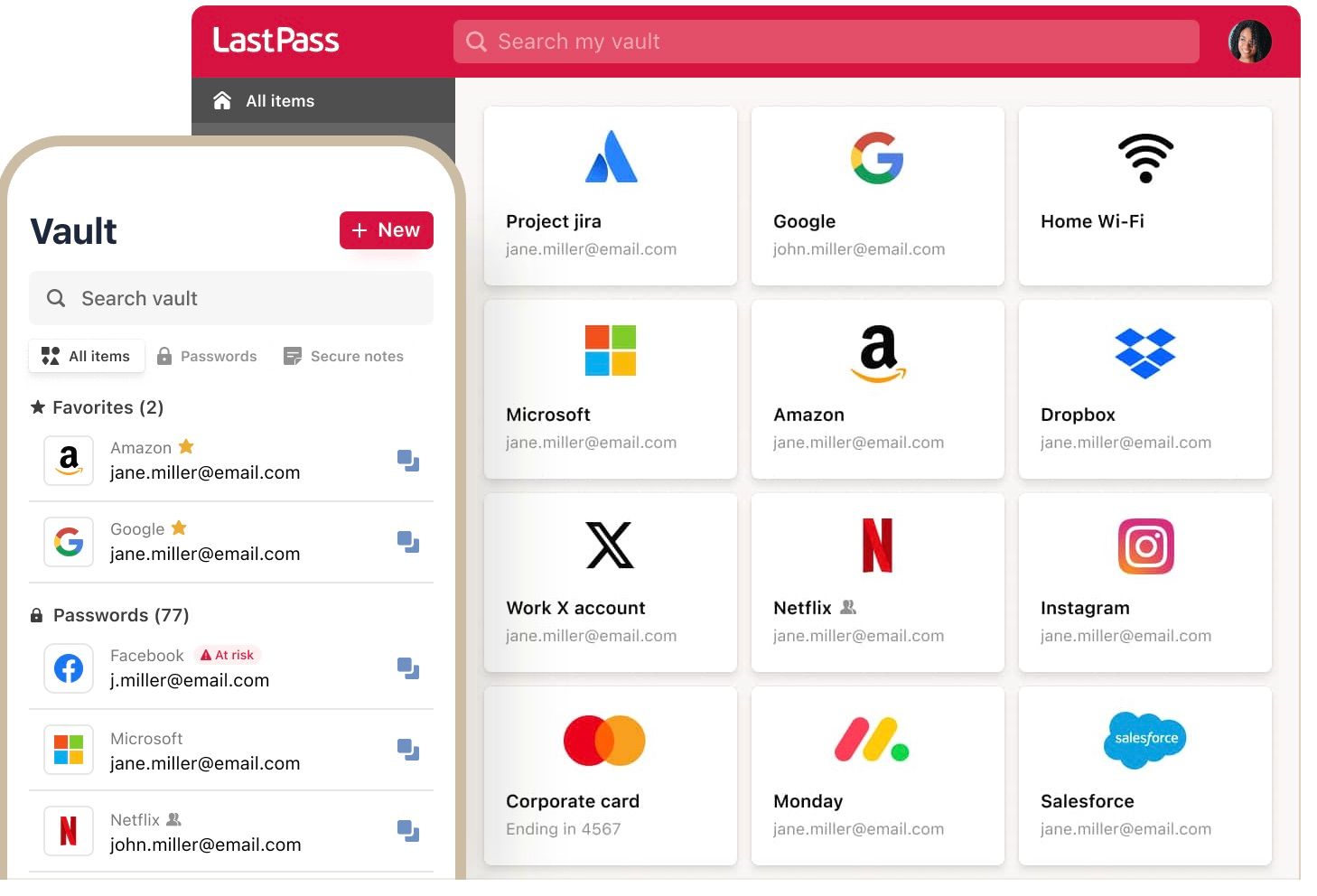
What’s the Deal?
LastPass used to rule the roost, but breaches in 2015, 2016, and 2022 have tarnished its reputation. It’s still got a solid free tier, but security-conscious folks might want to steer clear of it.
Security
LastPass uses AES-256 encryption and zero-knowledge design. It supports 2FA with apps, SMS, biometrics, or hardware keys. A combination of these makes it a robust password storage. The 2022 breach exposed encrypted vaults, but master passwords stayed safe. They’ve since enhanced encryption and introduced 2FA. However, its trust level among users is shaky.
Features
- Password Basics: Unlimited storage, generation, and autofill features.
- Passkey Beta: Limited support for passwordless logins.
- Secure Sharing: Share with individuals or groups to access a website.
- Dark Web Monitoring: Alerts for leaks (premium users only).
- Emergency Access: Let trusted contacts access your vault in a pinch for immediate access.
- Security Dashboard: Checks password health and recommends changes.
Ease of Use
LastPass is easy to set up and use. It has reliable extensions (Chrome, Firefox, Edge, Safari) and apps (iOS, Android). The interface feels outdated, though.
Compatibility
This password manager works on Windows, macOS, iOS, Android, and major browsers. Syncing across different platforms is solid.
Pricing
- Free: Unlimited passwords and syncing.
- Premium: Starts at $3/month (annual billing) with monitoring and emergency access, and a 30-day trial
- Business: Starts at $4.25/month, billed annually with a 14-day trial.
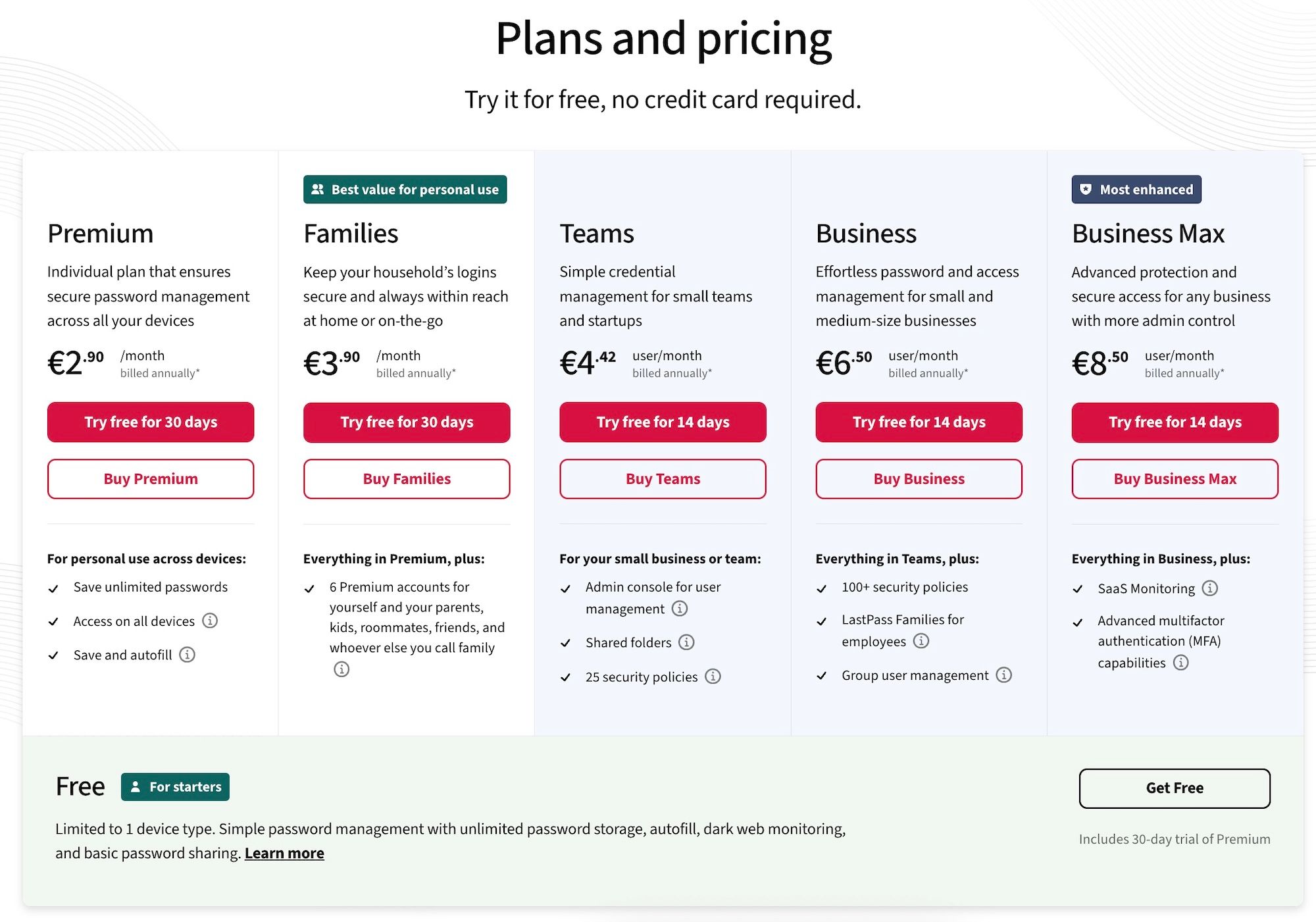
Support
Offers email and live chat, with priority for premium users. Support is decent.
Pros
- Great free tier.
- Easy to use.
- Wide compatibility.
Cons
- Breach history (2015–2022).
- Weak passkey support.
- Dated design.
Who’s It For?
Budget users who don’t mind the past breaches and want a free manager.
Comparison Table
| Password Manager | Free Tier | Starting Premium Price (Yearly Billing) | Encryption | Passkey Support | Unique Features | Best For |
| Proton Pass | Unlimited | $1.99/month for businesses and $2.99/month for individuals | AES-256 | Yes | Email masking, Sentinel | Privacy enthusiasts |
| Bitwarden | Unlimited | $10/year for personal users and $4/user/month for businesses | AES-256 | Yes | Self-hosting, CLI | Budget users |
| 1Password | None | $2.99/month for personal users and $7.99/user/month for businesses | AES-256 | Beta | Travel Mode, Watchtower | Families, businesses |
| Apple Passwords | Full | Free | AES-256 | Yes | iCloud, Wi-Fi sharing | Apple fans |
| Keeper | None | $39.99/year for personal users and $24/year for business | AES-256 | Yes | Self-destruct, 10GB storage | Businesses |
| Dashlane | 25 passwords | $4.99/month for personal users and $20/month for business users | AES-256 | Yes | VPN, phishing shield | Beginners, families |
| NordPass | Unlimited | $1.49/month $1.99 for 10-user package | XChaCha20 | Yes | Email masking, OCR | All-around users |
| LastPass | Unlimited | $3/month for personal users and $4.25 for businesses | AES-256 | Limited | Emergency access | Budget users |
What are passkeys?
Passkeys use cryptography to let you log in with a face scan or PIN, skipping passwords entirely. They help eliminate phishing, a common problem with passwords. This technology is backed by Apple, Google, and Microsoft. Most managers here (except LastPass) support passkeys, but only a few websites have implemented them. Password managers will bridge the gap for years to come.
Get a password manager today!
You can have several accounts for social media, email, banks, school access, and your workplace systems. Businesses also have tons of passwords to manage. Password managers help save and organize passwords so that they remain secure and accessible on whatever device you use. If you don't wish to pay for storage, pick one with the best free tier. Otherwise, you may use the free trial to examine the advanced features.